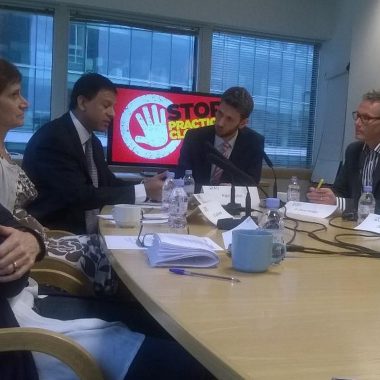Exclusive GP leaders have called for CQC inspections to be halted and the NHS Choices website to be scrapped amid a range of measures to ease the pressure on the profession and stop GP practices closing in the short term.
Debating at a roundtable hosted by Pulse yesterday, a group of GP leaders – including GPC chair Dr Chaand Nagpaul, former RCGP chair Dr Claire Gerada and Tower Hamlets-based ‘Save Our Surgeries’ campaigner Dr Naomi Beer – called for an emergency package to mitigate unsustainable GP workloads and to stop GP morale from plummeting further.
Also attended by NHS England head of primary care commissioning Dr David Geddes and NHS Clinical Commissioners co-chair Dr Amanda Doyle, the debate saw demands for emergency funding for GP premises and pausing of QOF work, as Professor Gerada argued that general practice was currently ‘held together by sellotape’.
The roundtable was held as part of Pulse’s campaign to Stop Practice Closures, after an investigation revealed that more than 100 practices had contacted LMCs across the UK about plans for closing.
Dr Nagpaul listed a series of emergency measures to prevent practice closures, including: short-term investment in infrastructure, including both small premises upgrades and money to add support staff; campaign to manage patient demand and expectiations on general practice and; the Government revising its communications strategy to ensure announcements do not give patients a negative picture of general practice.
Professor Gerada said that a priority should be for GPs to do less of the ‘extraenous’ work, such as preparing for CQC inspections, and called on Dr Geddes to ‘ask CQC’ to temporarily halt inspections.
She added: ‘I think it was me who suggested when I was chair of RCGP, about pausing QOF for a year or so… I think we need a very sensible look at what we can stop doing now, which will free up some time.’
Related stories
Video: Stop Practice Closures roundtable
Catch up on all the latest on Pulse’s campaign to Stop Practice Closures
Professor Gerada said a more immediate measure to stem plummeting morale she said would be to ‘scrap NHS Choices’.
She said: ‘There is this continuous ranking up of this monitoring, regulating, cruel atmosphere – juxtaposed against how we should be more compassionate… We should remove this culture of fear, so I would ask you to remove NHS Choices, to remove that website because it is the heartache every day when you get a negative comment, I don’t even look at the positive ones anymore. It is hard-wiring cruelty into our system.’
Dr Nagpaul agreed, saying: ‘The NHS Choices patient feedback is reducing us into some sort of absurd commodity. The fact is it is not even representative. It is selective and not [sufficiently] monitored. I agree with Clare that I don’t see any value in having that website with patient feedback. You do have a patient survey which gives you information because at least that gives you a representative feedback.’
Meanwhile, Dr Beer said she would like NHS England to address a ‘lack of transparency’ and for area teams to do less ‘nitpicking’.
She said: ‘I think NHS England has to take part of the rap for not actually challenging ministers about the remit that they have been given and not actually defending primary care. That is my grassroot-GP opinion.’
Responding to the lists of requests from the roundtable members, Dr Geddes said: ‘These are some good suggestions but some of them are quite costly.
‘We don’t have the infrastructure to be able to support primary care in doing things fundamentally differently at the moment so we need to work with our co-commissioning colleagues, with the GPC, looking at where those issues are which are burning general practice and need to be done differently.’
Pulse October survey
Take our July 2025 survey to potentially win £1.000 worth of tokens













